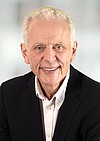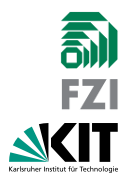„Uncle Bob“ ist Keynote-Sprecher der SE 2011

Robert „Uncle Bob“ Martin wird zum Thema „The Failure of State“ vortragen:
Functional languages have been around for over fifty years. Why are they suddenly gaining such widespread support and enthusiasm? Why are both major language empires frantically trying to grab the functional space? Are they succeeding? Or will they be bypassed by simpler more elegant functional languages like Clojure?
Why are traditional state-laden enterprise architectures suddenly succumbing to the radical change of append-only event sourcing? Is storage of events, as opposed to entities, the future? Why? Are SQL databases relevant anymore?
In this talk Uncle Bob talks about why the software world is about to radically change, and what software craftsmen need to be learning and practicing in order to meet that challenge.
Prof. Dr. Johannes Siedersleben

Prof. Dr. Johannes Siedersleben (QAware) wird über das Thema "Dynamische Analysen mit dem Software-EKG" votragen:
Gute Performance und hohe Robustheit sind das Ergebnis vermiedener Fehler und einer geeigneten Architektur. Das Software-EKG dient der systematischen Überprüfung von Performance und Robustheit auf der Basis von Monitoring und Logging. Man erkennt sowohl Programmierfehler (etwa einen Speicher-Leak) als auch Schwächen der Architektur (etwa einen ungeeigneten Client/Server-Schnitt). Das Software-EKG ist ein Verbund von Werkzeug und Vorgehen zur Unterstützung von Planung und Test nichtfunktionaler Eigenschaften. Das Vorgehen hat eine gewisse Ähnlichkeit mit dem Einsatz von EKGs in der Medizin: Man legt viele Messkurven übereinander; die Charts ähneln entfernt den richtigen EKGs. Und wie in der Medizin gibt es typische Krankheitsbilder, die wir mit Software-Unterstützung erkennen.
Prof. Dr. Lutz Heuser

Lutz Heuser (AGT), Sprecher Spitzencluster Unternehmenssoftware wird über "Software as a Mission Critial Resource – Why do CEOs of tomorrow care about Software?" vortragen.
The 21st century has brought a tremendous increase of Internet activities. Social networks have become a prime tool not only to share with your friends and family but to share news and ideas with practically everyone in the world. The "prosumer" of today is a user who wants to have easy access to the Internet infrastructure for both private and business purposes. The rising Internet of Services and Internet of Things are two megatrends complementing the social network philosophy. How will modern Software address these issues? Since the introduction of smart phones, the rise of Apps as a means to access the Internet has lead to an uncountable number of new mobile applications. Still, we haven't even seen the tip of the iceberg. If Apps is what we use tomorrow, how will they work together? What is the life cycle of an App? If the App is largely for free, who pays for our meal? What is a business App and what makes it different from any other App? Is the Business App of tomorrow the interface to the customer? How much should the CEO worry about Software and Apps?
In the presentation, we will show examples of megatrends that require Software as a mission critical resource in modern urban management such as intelligent buildings, smart grid management and disaster management.
Prof. Dr. Manfred Broy

Prof. Dr. Manfred Broy (TU München) wird zum Thema "Theorie des Software Engineering – Wofür denn?" vortragen.
Software Engineering ist eine überaus praktische Disziplin, zielt sie doch auf die Evolution praktisch einsetzbarer Softwaresysteme unter Berücksichtigung der Schlüsselfaktoren Qualität, Zeit und Kosten. In der Praxis werden Softwaresysteme heute jedoch noch all zu oft ad hoc entwickelt, bestenfalls unter Berücksichtigung empirischer Erkenntnisse ohne sich dabei hinreichend auf theoretische Überlegungen abzustützen, die das Funktionieren der verwendeten Prinzipien und Ansätze absichert. Die Theorie des Software Engineerings darf dabei nicht verwechselt werden mit dem Konzept der „formalen Methoden“, die den Einsatz formaler Techniken im Software Engineering anstreben. Die Theorie des Software Engineerings zielt darauf, Konzepte, Methoden und Vorgehensweisen des Software Engineerings in Hinblick auf essentielle Prinzipien und Eigenschaften wie etwa Modularität, Kompatibilität oder funktionale Abhängigkeit nachzuweisen – nicht nur um eine Fundierung und Validierung existierender praktischer Methoden zu sicherzustellen, sondern auch um Schwächen aufzudecken, neuartige Konzepte, Methoden und Ansätze im Software Engineering zu erforschen und Begriffe exakt zu fassen. Beispiele dafür sind Theorien für die Verbesserung des Einsatzes systematischer Methoden für die Anforderungsermittlung und –spezifikation, für Design und Architekturbeschreibung sowie Qualitätsmodellierung und –management.
Martin G. Fassunge, Herbert Illgner
Martin G. Fassunge SAP Development Project Director und Herbert Illgner Senior Vice President & COO SAP Products & Solutions werden zum Thema "Einführung und Skalierung schlanker Softwareentwicklung in einem Großunternehmen" vortragen.

